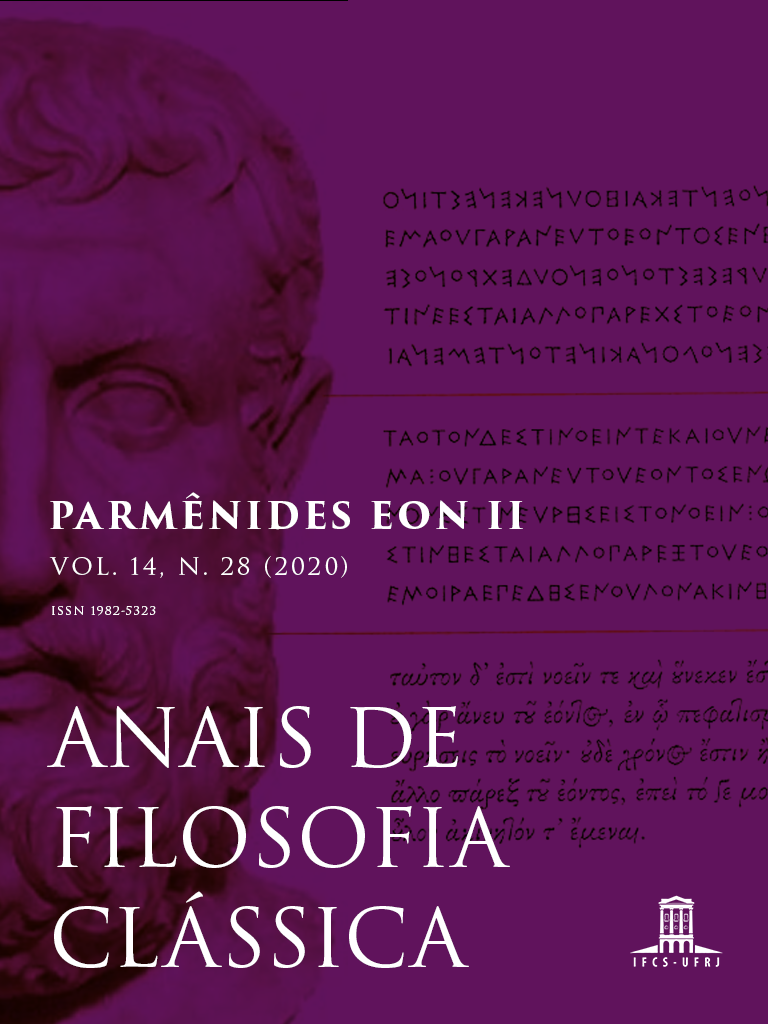The Metaphysics of Parmenides' Doxa and Its Influence
DOI:
https://doi.org/10.47661/afcl.v14i28.38783Keywords:
Parmenides, Presocratics, Metaphysics, ScienceAbstract
A great deal of attention has been given to the metaphysics of Parmenides’ Aletheia, the “Truth” section of his poem, and relatively little to the Doxa, or “Opinion” section. Here I address the latter. The Doxa appears to apply principles of the Aletheia, including the notion that a subject must have an unchanging nature or essence, to the problem of cosmology. In the Doxa, Parmenides posits two changeless beings, Light and Night, as the elements of a scientific ontology. All things in the world are composed of Light and Night in appropriate proportions. This is arguably the first time a theory of elements has been proposed for cosmology. Although Parmenides seems to disavow this construction, and may propose it only as a good example of an inadequate theory, his successors took it as a model to be followed in developing a defensible cosmology. In this way he becomes the founder of the modern scientific approach to theories of matter.
References
Barnes, J., The Presocratic Philosophers, revised edn. (London: Routledge & Kegan Paul, 1982).
Burkert, W., "Das Proömium des Parmenides und die Katabasis des Pythagoras," Phronesis 14 (1969) 1-30.
Crowley, T.J., "On the Use of Stoicheion in the Sense of 'Element'," Oxford Studies in Ancient Philosophy, 29 (2005) 367-394.
Curd, P., The Legacy of Parmenides, Princeton University Press, 1998.
Diels, H., Doxographi graeci (1879; repr.: Berlin: Walter de Gruyter, 1976).
-----, Elementum: Eine Vorarbeit zum griechischen und lateinischen Thesaurus (Leipzig: B.G. Teubner, 1899).
Furth, M. "Elements of Eleatic Ontology," JHPh 6 (1968): 111-132.
Graham, D.W., "A Testimony of Anaximenes in Plato," CQ 53 (2003) 327-337.
-----, Explaining the Cosmos: The Ionian Tradition of Scientific Philosophy (Princeton: Princeton University Press, 2006).
-----, "Heraclitus and Parmenides," in V. Caston and D.W. Graham (eds.) Presocratic Philosophy: Essays in Honour of Alexander Mourelatos (Aldershot: Ashgate, 2002) 27.
-----, "Heraclitus' Criticism of Ionian Philosophy," OSAPh 15 (1997) 1-50.
-----, "Leucippus's Atomism." P. Curd and D.W. Graham (eds.), The Oxford Handbook of Presocratic Philosophy (Oxford: Oxford University Press, 2008) 333-352.
-----, Science before Socrates: Parmenides, Anaxagoras, and the New Astronomy (Oxford: Oxford University Press, 2013).
-----, The Texts of Early Greek Philosophy (Cambridge: Cambridge University Press, 2010).
Guthrie, W.K.C., A History of Greek Philosophy, vol. 2: The Presocratic Tradition from Parmenides to Democritus (Cambridge: Cambridge University Press, 1965).
Heidel, W. A., "Peri physeos: A Study of the Conception of Nature among the Pre-Socratics," Proceedings of the American Academy of Arts and Sciences 45 (1910) 81-133.
Heath, T.L., Greek Astronomy (London: Dent: 1932).
Hunger, H. and Pingree, D. Astral Sciences in Mesopotamia (Leiden:Brill, 1999).
Kahn, C.H., Anaximander and the Origins of Greek Cosmology (New York: Columbia University Press, 1960; repr. Indianapolis: Hackett, 1994).
Kirk, G. S. et al., The Presocratic Philosophers, 2nd edn. (Cambridge: Cambridge University Press, 1983).
Koller, H., "Stoicheion," Glotta 34 (1955) 161-174.
Lumpe, A., "Der Begriff 'Element' im Altertum," ABG 7 (1962) 285-293.
Mourelatos, A.P.D., "Quality, Structure, and Emergence in Later Pre-Socratic Philosophy," Proceedings of the Boston Area Colloquium in Ancient Philosophy 2 (1987) 127-194.
-----, The Route of Parmenides, revised and expanded edn. (Las Vegas: Parmenides Publishing, 2008).
Naddaf, G., The Greek Concept of Nature (Albany: State University of New York Press, 2005).
Owen, G.E.L. "Eleatic Questions," CQ N.S. 10 (1960) 84-102.
Palmer, J., Parmenides and Presocratic Philosophy (Oxford: Oxford University Press, 2009).
Reiner, E. and Pingree, D., Babylonian Planetary Omens, Part 1: Enuma Anu Enlil, Tablet 63, (Malibu: Undena Publications, 1975).
Schwabe, W., 'Mischung' und 'Element' im Griechischen bis Platon (Bonn: Bouvier Verlag, 1980).
Stokes, M.C., One and Many in Presocratic Philosophy (Washington, D.C.: Center for Hellenic Studies, 1971).
Vollgraff, W., "Elementum," Mnemosyne 4 (1949) 89-115.


